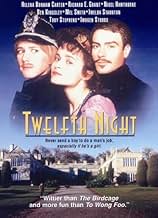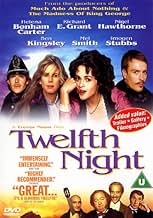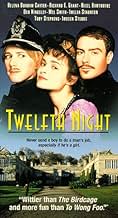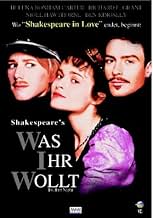VALUTAZIONE IMDb
7,1/10
6650
LA TUA VALUTAZIONE
Aggiungi una trama nella tua linguaShakespeare's comedy of gender confusion, in which a girl disguises herself as a man to be near the count she adores, only to be pursued by the woman he loves.Shakespeare's comedy of gender confusion, in which a girl disguises herself as a man to be near the count she adores, only to be pursued by the woman he loves.Shakespeare's comedy of gender confusion, in which a girl disguises herself as a man to be near the count she adores, only to be pursued by the woman he loves.
- Regia
- Sceneggiatura
- Star
- Premi
- 1 vittoria e 2 candidature totali
Sidney Livingstone
- Captain
- (as Sid Livingstone)
David Burke
- Party Guest
- (non citato nei titoli originali)
- …
Recensioni in evidenza
Slick Shakespeare adaptation, well acted and very humorous (in parts) in its telling. Naturally, there's always going to be some differences from stage to cinema. The film took advantage of this, of course, to avoid a "stage" feel. The perceptions, or rather the misperceptions, of people and motivations are well explored and portrayed. Ben Kingsley is a standout, for his interesting twist on the character Feste. In short, a good adaptation and film. Recommended.
Reading other reviews of 'Twelfth Night' it is interesting to see that some people think it is a slow film and others quite fast. It gripped me from the opening gust of rain on a dark night to Feste dancing off into the sunset. Grappling with Shakespeare is a perilous activity but I thought Trevor Nunn brought out the comedy and the emotions of the story well. It is a film to make you smile at the follies of mankind but also their charm.
Ben Kingsley is amazing. I've never seen Feste played that way but it seemed perfect. Imogen Stubbs does the comedy and the drama equally well. The scene with Orsino in the bathtub is a stock one but she does it beautifully, balancing the humour of the situation with the tenderness and the longing. Imelda Staunton brings unusual depth to the character of Maria. The rest of the cast are great too.
The text of the play is changed around but not unnaturally so. The scene that cuts between Feste's song and Viola/Cesario and Orsino playing cards is wonderful, taking in eight of the characters and telling you more about them. The last act of the play is difficult to stage well but Nunn gives it a good shot.
The Cornwall setting is lovely, the radiant sunshine, the green leaves and fine buildings are captured gorgeously by the cameras. I also liked the music very much and find some of the tunes quite hummable.
Very enjoyable and worth seeing again and again.
Ben Kingsley is amazing. I've never seen Feste played that way but it seemed perfect. Imogen Stubbs does the comedy and the drama equally well. The scene with Orsino in the bathtub is a stock one but she does it beautifully, balancing the humour of the situation with the tenderness and the longing. Imelda Staunton brings unusual depth to the character of Maria. The rest of the cast are great too.
The text of the play is changed around but not unnaturally so. The scene that cuts between Feste's song and Viola/Cesario and Orsino playing cards is wonderful, taking in eight of the characters and telling you more about them. The last act of the play is difficult to stage well but Nunn gives it a good shot.
The Cornwall setting is lovely, the radiant sunshine, the green leaves and fine buildings are captured gorgeously by the cameras. I also liked the music very much and find some of the tunes quite hummable.
Very enjoyable and worth seeing again and again.
Reading Trevor Nunn's thoughts on his film, it is easy to conclude that they were lucky to obtain such sublime weather for the large duration of the filming, in November. The Cornwall locations are absolutely enchanting; showing an England so far from the urban norm these days. The beautiful natural light, with later dark contrasts, perfectly complements the jovial, winning mood of this Shakespeare comedy brought to screen: and, what is more, this is truly beyond any sense of 'heritage cinema', as Shakespeare's genius is retained.
Yes, it is all a very 'accessible' package, but much is unusual and distinctive to this film adaptation. Ben Kinglsey is perhaps the most glaring instance of a radical re-invisioning; his acting - stripped bare of artifice - is utterly compelling and keeps you watching his every mannerism. This Feste is an eccentric, multi-talented clown and performer, but he also bears words of cutting, melancholy truth. Indeed, both are wonderfully combined with the gorgeously sad scene of Staunton, Grant and Smith listening to his sad song: they listen and the words cut into their veneers. Loneliness is at their very core. What a brilliantly rounded comedy this is; balanced by melancholy - the inch-perfect awry note struck by Hawthorne's Malvolio appearing at the end - and good will - the comradely bonhomie that Grant and Smith are indeed shown to share.
Hawthorne and perhaps more surprisingly Mel Smith and Richard E. Grant really do a fine job and imbuing some real character in their parts; treading a line between broad comedic playing and human sadness. Along with Kingsley's career-best (? not seen too many of his films) performance, they lend this film its heart, and play very well against the wonderful settings. Mackintosh and Stubbs are I guess a little less compelling, but these roles are really difficult to carry off... nothing about them really lingers too long in the memory, like Kingsley's expressions, bizarre little pieces of dance and his pared-down delivery. Helena Bonham Carter is perhaps overly assured as the vain countess dame, Olivia: oh so archly bemused when faced by the cross-gartered, prancing Hawthorne, but generally Ms. Bonham Carter is very much in her usual, predictably petulant, period-costume mode. Which is probably being unfair; she does convince, at the end of the day.
Overall then, a wonderfully colourful delight, bearing the flavour of bright, melancholy late summer-into-autumn. A strange chill is cast by the compelling Kinglsey; a sadness that cannot be dispelled. This film has light amusement in addition to this real edge, and is ultimately a very affecting rendering of a bona fide Shakesperean classic.
Yes, it is all a very 'accessible' package, but much is unusual and distinctive to this film adaptation. Ben Kinglsey is perhaps the most glaring instance of a radical re-invisioning; his acting - stripped bare of artifice - is utterly compelling and keeps you watching his every mannerism. This Feste is an eccentric, multi-talented clown and performer, but he also bears words of cutting, melancholy truth. Indeed, both are wonderfully combined with the gorgeously sad scene of Staunton, Grant and Smith listening to his sad song: they listen and the words cut into their veneers. Loneliness is at their very core. What a brilliantly rounded comedy this is; balanced by melancholy - the inch-perfect awry note struck by Hawthorne's Malvolio appearing at the end - and good will - the comradely bonhomie that Grant and Smith are indeed shown to share.
Hawthorne and perhaps more surprisingly Mel Smith and Richard E. Grant really do a fine job and imbuing some real character in their parts; treading a line between broad comedic playing and human sadness. Along with Kingsley's career-best (? not seen too many of his films) performance, they lend this film its heart, and play very well against the wonderful settings. Mackintosh and Stubbs are I guess a little less compelling, but these roles are really difficult to carry off... nothing about them really lingers too long in the memory, like Kingsley's expressions, bizarre little pieces of dance and his pared-down delivery. Helena Bonham Carter is perhaps overly assured as the vain countess dame, Olivia: oh so archly bemused when faced by the cross-gartered, prancing Hawthorne, but generally Ms. Bonham Carter is very much in her usual, predictably petulant, period-costume mode. Which is probably being unfair; she does convince, at the end of the day.
Overall then, a wonderfully colourful delight, bearing the flavour of bright, melancholy late summer-into-autumn. A strange chill is cast by the compelling Kinglsey; a sadness that cannot be dispelled. This film has light amusement in addition to this real edge, and is ultimately a very affecting rendering of a bona fide Shakesperean classic.
As with most Shakespearian comedies, the plot is deeply implausible. However, the excellent Cornish locations at St Michael's Mount & Lanhyrock give a good sense of place and the winter setting (apart from the scene of apple picking!) comes across well - it really does look like an English winter, rather than a picture postcard snow-scene.
The play is cut down to a manageable length without losing the sense of it, The broad comedy aspects (Toby Belch et al) are thankfully limited.
The acting is well done by a cast of British stalwarts. Amazingly, Viola and Sebastian actually do look broadly alike.
This film is best viewed as an amusing light romantic comedy rather than a side-splitter.
The play is cut down to a manageable length without losing the sense of it, The broad comedy aspects (Toby Belch et al) are thankfully limited.
The acting is well done by a cast of British stalwarts. Amazingly, Viola and Sebastian actually do look broadly alike.
This film is best viewed as an amusing light romantic comedy rather than a side-splitter.
A lively, bubbly production of one of Shakespeare's more difficult plays. It's hard to know just what Shakespeare was getting at with this story. The text doesn't always seem to make sense. That's reflected in this, as well as any other, production. At times, one wonders what the expressions on characters' faces are meant to indicate. Just after Feste has fooled Malvolio with his imitation of the curate, for instance, Maria has a perturbed look on her face. As if the joke that she herself so elaborately designed now troubles her. There's nothing in the text to indicate that her expression should show remorse; and yet Sir Toby soon after says that he's sick of the whole thing. Why? That's one example of the difficulty of the text (which may have been corrupted over the centuries), and how it is manifested in this particular production's choices. I don't know why Sir Toby remarks at this point that he's sick of the joke, nor do I know whether Maria should share his feelings.
Another difficulty is the role of Feste. Ben Kingsley fills this role, and because Ben Kingsley is a major star, he magnifies this character (in my opinion) out of all proportion. He becomes a sort of Zen master, pompous and oppressive. His jokes aren't funny (maybe we can't find Shakespeare's jokes funny today, but Kingsley's heavy delivery precludes humor), and his last confrontation with Malvolio comes off as a sort of thundering divine retribution. The entire play, the entire cast, stops dead and Feste takes over as if the whole point of the play has been his apotheosis at the expense of the degraded Malvolio. This surely cannot be what Shakespeare had in mind. Throughout the play he has a disconcerting habit of staring at other characters or the camera with what almost be described as a leer.
Maybe Shakespeare would have sighed and commiserated with the producer of this film, because the clowns in his day were also big stars who demanded a lot of meat in their roles. The trouble is that there just isn't much meat in Feste's role according to the text, so we're stuck with leers and thundering retribution and other inventions. Shakespeare had to accommodate his clowns with ever-more important roles, climaxing with characters like Touchstone and Lear's fool. Kingsley is just inventing his own character. At times his work is interesting, but his weight in the production is, as I said, oppressive.
Still, his screen time is relatively small, and much of the rest of the play is a joy, even if the point of the story isn't always clear. Bonham-Carter was never more alluring, Hawthorne is priceless as Malvolio (he was born for the role), and Smith and Grant are the perfect combination of Belch and Aguecheek. I suppose you might object that all four of them put their eyebrows to such prodigious use that their acting might be characterized as hamming. But I don't see how any of these characters can be played straight if the play is to work.
One thing is for sure, no one would ever accuse this production of bogging down. The pace is lively, the sets and the cinematography are always striking, the score is invigorating, and I suspect that I could watch this film dubbed in Swahili and it would still be a lot of fun. Visually arresting is perhaps the best description.
Another difficulty is the role of Feste. Ben Kingsley fills this role, and because Ben Kingsley is a major star, he magnifies this character (in my opinion) out of all proportion. He becomes a sort of Zen master, pompous and oppressive. His jokes aren't funny (maybe we can't find Shakespeare's jokes funny today, but Kingsley's heavy delivery precludes humor), and his last confrontation with Malvolio comes off as a sort of thundering divine retribution. The entire play, the entire cast, stops dead and Feste takes over as if the whole point of the play has been his apotheosis at the expense of the degraded Malvolio. This surely cannot be what Shakespeare had in mind. Throughout the play he has a disconcerting habit of staring at other characters or the camera with what almost be described as a leer.
Maybe Shakespeare would have sighed and commiserated with the producer of this film, because the clowns in his day were also big stars who demanded a lot of meat in their roles. The trouble is that there just isn't much meat in Feste's role according to the text, so we're stuck with leers and thundering retribution and other inventions. Shakespeare had to accommodate his clowns with ever-more important roles, climaxing with characters like Touchstone and Lear's fool. Kingsley is just inventing his own character. At times his work is interesting, but his weight in the production is, as I said, oppressive.
Still, his screen time is relatively small, and much of the rest of the play is a joy, even if the point of the story isn't always clear. Bonham-Carter was never more alluring, Hawthorne is priceless as Malvolio (he was born for the role), and Smith and Grant are the perfect combination of Belch and Aguecheek. I suppose you might object that all four of them put their eyebrows to such prodigious use that their acting might be characterized as hamming. But I don't see how any of these characters can be played straight if the play is to work.
One thing is for sure, no one would ever accuse this production of bogging down. The pace is lively, the sets and the cinematography are always striking, the score is invigorating, and I suspect that I could watch this film dubbed in Swahili and it would still be a lot of fun. Visually arresting is perhaps the best description.
Lo sapevi?
- QuizIn the mid 1950s, director Joseph L. Mankiewicz tried to set up a version with Audrey Hepburn and Danny Kaye, but it failed to materialize.
- BlooperDuring one of the final scenes, when Malvolio reenters, it can be seen that his left shoe is missing. However, as he is walking up the stairs, you can clearly hear both heels clicking on the steps.
I più visti
Accedi per valutare e creare un elenco di titoli salvati per ottenere consigli personalizzati
- How long is Twelfth Night?Powered by Alexa
Dettagli
- Data di uscita
- Paesi di origine
- Sito ufficiale
- Lingua
- Celebre anche come
- Twelfth Night
- Luoghi delle riprese
- Lanhydrock House, Bodmin, Cornwall, Inghilterra, Regno Unito(Olivia's house and garden)
- Aziende produttrici
- Vedi altri crediti dell’azienda su IMDbPro
Botteghino
- Budget
- 5.000.000 USD (previsto)
- Lordo Stati Uniti e Canada
- 588.621 USD
- Fine settimana di apertura Stati Uniti e Canada
- 33.451 USD
- 27 ott 1996
- Lordo in tutto il mondo
- 588.621 USD
Contribuisci a questa pagina
Suggerisci una modifica o aggiungi i contenuti mancanti




































